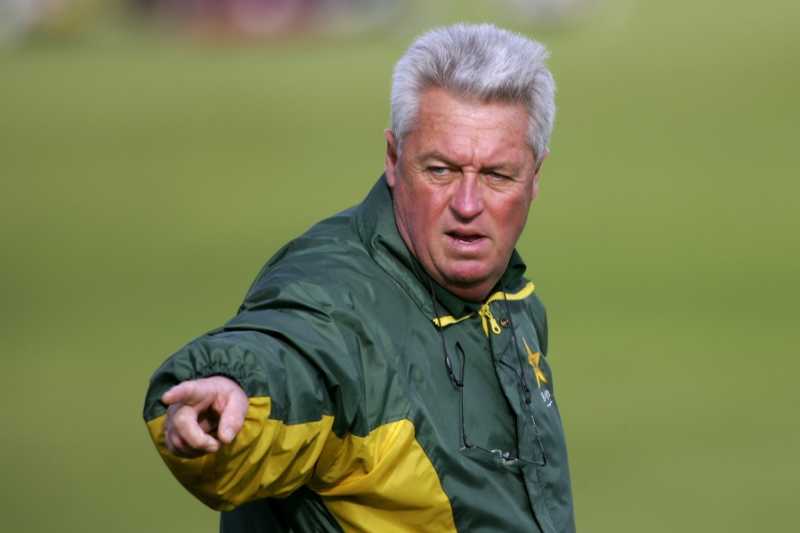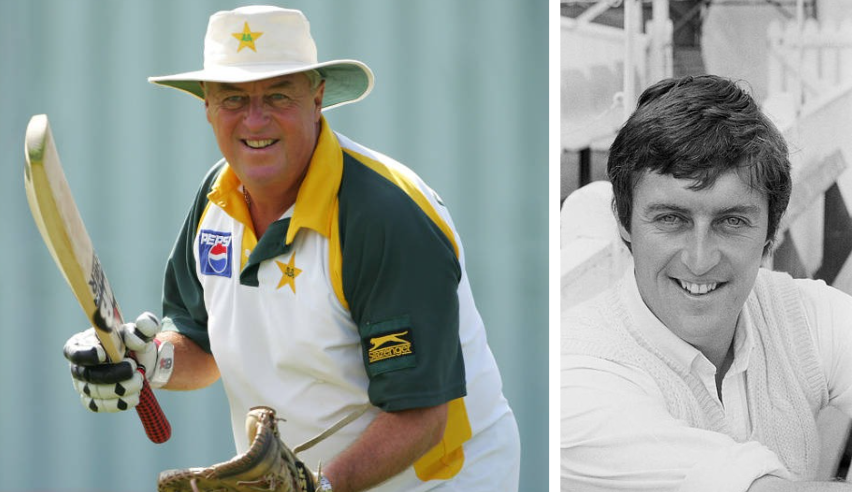Bob Woolmer remains one of the most respected and discussed figures in world cricket. Known for his roles as both a skilled batsman and a revolutionary coach, he left a mark that still influences the game today.
Quick Bio
| Detail | Information |
|---|---|
| Full Name | Robert Andrew Woolmer |
| Known As | Bob Woolmer |
| Date of Birth | 14 May 1948 |
| Place of Birth | Kanpur, Uttar Pradesh, India |
| Nationality | English |
| Profession | Cricketer, Cricket Coach |
| Batting Style | Right-handed batsman |
| Bowling Style | Right-arm medium pace |
| International Debut | 1975 (England) |
| Last International Match | 1981 (England) |
| Major Teams | England, Kent, Natal |
| Coaching Career | South Africa (1994–1999), Pakistan (2004–2007) |
| Date of Death | 18 March 2007 |
| Place of Death | Kingston, Jamaica |
Who is Bob Woolmer?

Bob Woolmer was an English cricketer who went on to become one of the most influential coaches of modern times. While his playing career with England was respectable, his coaching legacy is what truly defines him. He pioneered data-driven training methods, embraced technology in cricket analysis, and helped teams like South Africa and Pakistan modernize their playing style. For many fans and players alike, Woolmer was not just a coach but also a mentor and innovator.
Early Life and Background

Born on 14 May 1948 in Kanpur, India, during the British colonial period, Bob Woolmer spent his early childhood in South Asia before his family moved back to England. His father, who also had a deep love for cricket, introduced young Bob to the game. As a child, he was already showing remarkable cricketing skills and a strong interest in sports. Educated in Kent, England, Woolmer balanced academics with his growing passion for cricket, eventually earning his way into professional county cricket. This early foundation in both discipline and creativity shaped him into the unique player and coach he later became.
Age and Physical Appearance
At the height of his playing days, Bob Woolmer stood at about 6 feet tall with a strong athletic build. His physique was typical of a top-level cricketer of the 1970s, combining endurance with adaptability. Over time, as he transitioned from playing to coaching, his physical presence softened but his charismatic personality and approachable demeanor made him a natural leader. At the time of his death in 2007, he was 58 years old, leaving behind a career filled with achievements and lessons for future generations.
Cricket Career (As a Player)
Woolmer’s playing career was distinguished though not legendary. He made his Test debut for England in 1975, at the peak of the West Indies’ dominance in cricket. A reliable middle-order batsman, Woolmer was known for his patience and ability to anchor innings. He scored over 1,000 runs in Test cricket and became particularly known for his defensive technique combined with an eye for innovative stroke play.
At the county level, Woolmer represented Kent, where he played a crucial role in domestic competitions. His performances in county cricket were highly consistent, which earned him a spot in the England side for major series. Although he never became a superstar player, his contributions were respected and his understanding of the game made him stand out among his peers.
Transition to Coaching
After retiring from professional cricket in the early 1980s, Bob Woolmer redirected his career towards coaching. What made his coaching journey unique was his forward-thinking approach. Unlike traditional coaches who focused only on technique and practice, Woolmer emphasized mental conditioning, fitness, nutrition, and tactical planning. He was one of the earliest coaches to incorporate computer technology into cricket analysis, creating detailed breakdowns of player performance and opposition strategies.
His innovative philosophy quickly attracted attention, and he became a sought-after coach around the world.
International Coaching Career
As an international coach, Bob Woolmer developed a reputation for modernizing cricket. His use of video analysis and scientific methods helped players understand their strengths and weaknesses better. He also valued team unity, discipline, and adaptability, which made him highly effective with both experienced cricketers and newcomers. His two most notable stints were with South Africa and later with Pakistan.
South Africa (1994–1999)
Woolmer took over as coach of South Africa in the mid-1990s, shortly after the country’s return to international cricket post-apartheid. Under his leadership, South Africa quickly became one of the most competitive teams in the world. With players like Hansie Cronje, Jonty Rhodes, and Allan Donald, Woolmer’s methods helped South Africa achieve consistency.
However, his time with South Africa was not without controversy. The team suffered heartbreaking losses in World Cups, including the famous 1999 semi-final against Australia. Despite the setbacks, Woolmer was widely credited for laying the foundation of South Africa’s rise as a cricketing powerhouse.
Pakistan (2004–2007)
In 2004, Woolmer was appointed head coach of the Pakistan national team, a side known for its unpredictability and raw talent. His challenge was immense: managing a team with extraordinary players but often plagued by inconsistency. Woolmer worked on improving discipline and introduced fitness regimes and tactical planning that were new to many Pakistani cricketers.
During his tenure, Pakistan achieved notable successes, including victories against India and England. He worked closely with players like Inzamam-ul-Haq, Mohammad Yousuf, and Shoaib Akhtar, helping them refine their game. However, his coaching period also faced difficulties, with controversies and mixed performances in ICC tournaments.
His Famous Students
Many cricketers who worked with Bob Woolmer credit him for shaping their careers. South African stars such as Shaun Pollock and Jacques Kallis flourished under his guidance. In Pakistan, legends like Shahid Afridi and Younis Khan acknowledged Woolmer’s role in helping them grow mentally and technically. His ability to inspire confidence in players made him more than just a coach—he became a mentor and father figure.
Controversies and Challenges
Woolmer’s career was not free of challenges. His innovative style sometimes clashed with traditional cricket boards and players who resisted change. During his South African tenure, he faced criticism after World Cup losses. With Pakistan, media scrutiny was intense, and differences between management and players occasionally surfaced. Yet, despite these challenges, Woolmer remained committed to his coaching philosophy, always emphasizing growth and professionalism.
Tragic Death and Conspiracy Theories
On 18 March 2007, just after Pakistan’s shocking exit from the Cricket World Cup, Bob Woolmer was found dead in his hotel room in Kingston, Jamaica. His sudden death shocked the cricketing world. Initial reports suggested strangulation, sparking conspiracy theories about foul play. Later, conflicting autopsy reports and investigations only deepened the mystery. Some believed he was murdered, while others concluded it was natural causes linked to heart failure.
To this day, his death remains surrounded by speculation, making it one of the most debated tragedies in cricket history.
Legacy and Contributions
Despite his untimely death, Bob Woolmer’s legacy lives on. He is remembered as one of the first coaches to bring science, technology, and data analysis into cricket. His teachings influenced future coaches and transformed the way international teams prepare for matches. Players who worked with him continue to speak about his kindness, intellect, and passion for the sport.
More than anything, Woolmer will be remembered as a man who pushed cricket into the modern era, balancing tradition with innovation.
Conclusion
Bob Woolmer’s life was a journey of passion, innovation, and dedication to cricket. From his days as a steady batsman for England to becoming a pioneering coach for South Africa and Pakistan, his influence stretched far beyond the scoreboard. His sudden death left a void, but his methods and philosophy continue to inspire. Today, he is honored as a visionary who reshaped cricket into the professional, analytical sport we see now.
FAQs
What was Bob Woolmer known for?
Bob Woolmer was known as an English cricketer and a revolutionary coach who introduced modern methods like video analysis and fitness regimes into cricket.
Which teams did Bob Woolmer coach?
He coached South Africa (1994–1999) and Pakistan (2004–2007).
How did Bob Woolmer die?
He was found dead in his hotel room during the 2007 World Cup. The cause remains debated, with reports suggesting natural causes and others hinting at foul play.
What was Bob Woolmer’s contribution to cricket?
He transformed coaching by using technology, data, and scientific approaches, helping modernize the sport.
Visit For More Information Go To entrepreneurideas
